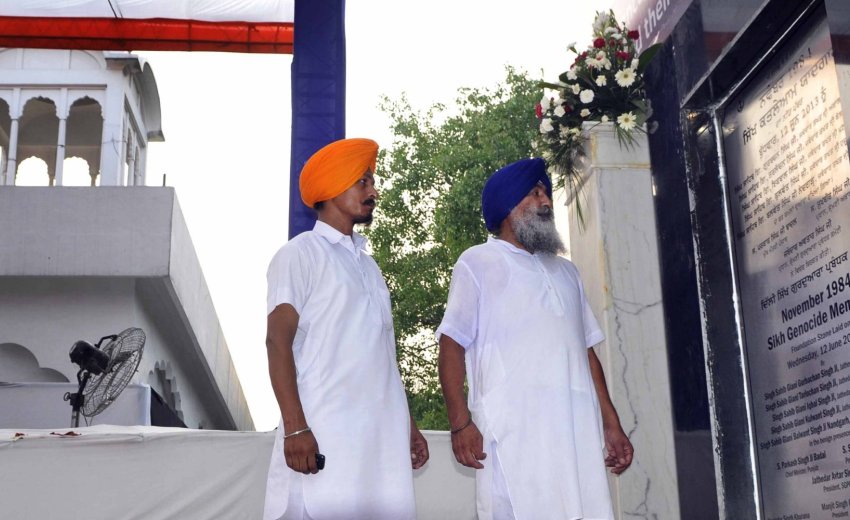Reaffirming commitment to democracy and human rights, the Ontario Legislature recognized the 1984 Anti-Sikh violence as genocide. Since genocide is a politically charged term, it is rarely used. But, in this instance, acknowledging what happened in 1984 was genocide was truthful, sincere and healing.
The motion was passed by MPP Harinder Malhi belonging to the ruling Liberal Party of Ontario in 2017. The motion said the Legislative Assembly of Ontario should seek to condemn all forms of violence, hatred, prejudice, and racism in India and other parts of the world, “including the 1984 Genocide perpetrated against the Sikhs throughout India”.
The Canadian government opened its borders to Sikh refugees fleeing persecution by the Indian government in the 1980s. Thousands of Sikh youths were going missing, and the government said they were terrorists who had retreated underground. It was ultimately made public with Canadian aid, that the government had been involved in a campaign of extrajudicial killings.
Jaswant Singh Khalra
Sikhs were systematically exterminated in Punjab for over a decade. In 1995, Jaswant Singh Khalra uncovered police cremation records that proved the murders of innocent Sikh youth. He presented his findings to the Canadian Parliament in June of that year. His return to India in September led to his abduction and torture. Jaswant Singh's body was cut into pieces and dumped into the river.
Justice Kuldip Singh and Justice Saghir Ahmed expressed 'horror and shock' at the evidence Khalra had collected, describing the acts as’ worse than genocide'.
Jaswant Khalra is now recognised by Amnesty International as an International Defender of Human Rights, and the Canadian Museum for Human Rights has an entire exhibit dedicated to his honour.
Jaswant Singh Khalra shed light on a horrific historical event that many Sikh kids grew up witnessing. The weekly newspaper featured photos of bullet-ridden Sikh men with police officials hovering over them like a hunter might over their prey. Women were also the targets of horrific sexual assault, including rape by government officials. Sikhs in India were a persecuted minority who made up about 2% of the country's overall population.
Unfortunately, disappearances were only the tip of the iceberg. The genocide culminated in unhinged, State-facilitated violence in November 1984, resulting in widespread human rights violations. The Nanavati Commission report led by former Supreme Court Justice, G.T Nanavati, debunked the Indian government's claim that the violence was caused due to Indira Gandhi's assassination.
According to Justice Nanavati's report, " all this could not have happened [in November 1984] if it was merely a spontaneous reaction of the angry public. The systematic manner in which the Sikhs were thus killed indicates that the attacks on them were organised."
What happened in 1984?
Political officials at the time facilitated anti-Sikh violence by using voter lists to locate Sikh homes and led mobs armed with explosive material into Delhi via the state-owned and operated transit system. For four days, Sikh men were burned alive. Sexual violence against women was inconceivable and grotesque. Several children were beheaded.
Justice Nanavati confirmed that rumours to incite violence against Sikhs had been widely spread by many, including the police, and that in many instances, the police had taken away their [Sikhs'] arms or other items with which they could have defended themselves against mob attacks.
Based on a blog by Amneet Singh Bali on HuffPost
Born in 1986, Amneet grew up in aftermath of what is known as the Sikh Genocide of 1984. Raised among trauma-afflicted families in university, he elected to study genocide. In addition to his Honours degree in Social Justice and Peace Studies, he also holds a Master's degree in Conflict Studies.
Amneet puts forward his perspective based on studies and reviews of academic literature, that it is clear that the Indian government committed genocide. The opposition overwhelmingly came from organisations heavily linked to India's consular services in Canada, which threatened the Ontario Legislature with economic sanctions.
Deputy leader of Ontario's New Democrats Jagmeet Singh was denied a visa to India and he openly expressed concerns about the Consulates' attempts to blackmail him. The divisive message propagated by these organisations does not reflect the views of many, including Indian Home Minister Rajnath Singh who has recognized the 1984 attacks on Sikhs as genocide.
In addition to being resilient, Canadian democracy is also compassionate. Sikhs have been severely scarred by state-sponsored violence in India for many years. There have been many generations affected by that pain.
Despite this, there is a path to healing from all of this. Leading trauma and reconciliation expert Dr Judith Herman has observed that the prerequisites for this approach are remembrance and truth-telling. That is why the Ontario Legislature's motion is unifying and healing.
The democratic institutions of Canada and Ontario have shown a dedication to seeking the truth. Amneet applauds the courageous MPPs who voted in favour of this motion. He concludes that moving forward will be challenging, but it will also be a route toward healing and unification.
His message for those defending the truth and justice is to continue on the journey. Be persistent. In the end, the only path to healing is through the truth.

